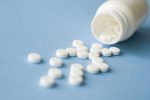Oral Anti-inflammatory LYT-100 Well-tolerated in Healthy People
Written by |

LYT-100 (deupirfenidone), an experimental oral therapy containing a similar active ingredient to Esbriet, was well-tolerated at all tested doses — and did not reach the maximum tolerated dose or MTD — in a Phase 1 trial conducted in healthy volunteers.
PureTech Health, which is developing LYT-100 for idiopathic pulmonary fibrosis (IPF) and other diseases involving inflammation and tissue scarring, hopes this therapy will ease lung function decline in patients without the digestion-related side effects common with Esbriet.
The early results also show that LYT-100 may be able to be taken with or without food, researchers noted.
“The data set from the completed Phase 1 MAD [multiple ascending dose] study, including a favorable safety and tolerability profile, reaffirms our belief that LYT-100 has the potential to be an attractive therapeutic option across a range of conditions,” Michael Chen, PhD, head of innovation at PureTech, said in a press release.
PureTech announced top-line data from the trial late last year. Now, full results have been reported in “A Randomized Phase 1 Evaluation of Deupirfenidone, a Novel Deuterium-Containing Drug Candidate for Interstitial Lung Disease and Other Inflammatory and Fibrotic Diseases,” a study published in the journal Clinical Pharmacology in Drug Development.
The main ingredient in LYT-100, deupirfenidone, is a chemically modified version of pirfenidone, which is the active ingredient of Esbriet, an approved IPF treatment sold by Roche. Esbriet has been shown to reduce lung function decline in IPF patients, but it often causes digestion-related side effects, which have limited its use.
According to PureTech, LYT-100 was designed to retain the anti-inflammatory and antifibrotic effects of Esbriet, but with a better safety profile. This improvement, the company says, is due to differences in how the two compounds are metabolized, or processed, in the body.
Prior data have suggested that LYT-100 leads to greater drug exposure than Esbriet when given at Esbriet’s approved dose of 801 mg three times daily.
“There are substantial shortcomings with the current standards of care for patients living with fibrotic lung disease, and we believe that the anti-fibrotic and anti-inflammatory properties along with the favorable tolerability profile demonstrated with LYT-100 to date could address this issue,” Chen said.
The Phase 1 trial (NCT04243837), sponsored by PureTech, is currently assessing the safety, tolerability, and pharmacological properties of multiple doses of LYT-100 in healthy volunteers.
In the first part of the trial, participants were given LYT-100 at doses of 100, 250, 500, 750, or 1,000 mg, or a placebo, taken with breakfast and dinner for five consecutive days.
This portion enrolled 40 participants with a median age of 27. Most identified as white (70%) or Asian (15%). Three-quarters of participants were female, which the researchers noted was a deliberate choice to help support LYT-100’s development for complications related to breast cancer, which is more common in women.
Safety data overall were positive: there were no serious adverse events (side effects) reported in the study, and no adverse events that led participants to discontinue the therapy. The most common side effects reported were headache, abdominal distention, and nausea.
“LYT-100 was well tolerated in the dose range from 100 to 1000 mg twice daily over 5 days of treatment,” the researchers concluded.
Notably, an independent committee was tasked with reviewing safety data for the trial as it was progressing to determine the therapy’s MTD, or maximum tolerated dose — the highest dosage that can be given without unacceptable side effects.
The MTD was not reached in this study, PureTech noted.
Pharmacological analyses “suggest that LYT-100 can be administered twice daily and would be expected to achieve a similar level of systemic exposure as expected following administration of the labeled dosage of pirfenidone [Esbriet], 801 mg three times a day,” the researchers wrote.
In a second part of the study, eight participants who completed the first portion were randomly assigned to take 500 mg of LYT-100 with or without food.
The results showed that Cmax, the maximum level of medication in a patients’ blood, was reduced by 26% when LYT-100 was taken with food. Of note, according to Esbriet’s prescribing information, taking the approved therapy with food reduces exposure by 49%.
“The food effect results suggest that LYT-100 may be given without regard to food,” the team wrote.
Because the MTD was not reached in this initial trial, PureTech has launched another study to test higher doses of LYT-100 in healthy volunteers. The company also is conducting further studies of the safety and pharmacological properties of LYT-100 in healthy volunteers and healthy older adults.
In addition, LYT-100 is currently being tested in two Phase 2 trials. One trial involves people with lymphedema, a type of swelling, related to breast cancer (NCT04243837), and another includes people with long-term complications following COVID-19 (NCT04652518). Results from all of these trials are expected next year.
“We’re encouraged by these results and look forward to the upcoming clinical readouts as we advance LYT-100 in multiple indications,” Chen said.








